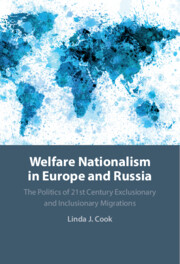 Welfare Nationalism in Europe and Russia
Welfare Nationalism in Europe and Russia Book contents
- Welfare Nationalism in Europe and Russia
- Reviews
- Welfare Nationalism in Europe and Russia
- Copyright page
- Dedication
- Contents
- Figures
- Tables
- Preface
- Acknowledgments
- Note on Terminology
- Abbreviations
- Part I Introduction
- Part II Economic Drivers and Political Mobilizers of Welfare Nationalism and Exclusion in Russia and Europe
- 2 Economic Drivers of Welfare Nationalism
- 3 Political Mobilizers of Welfare Nationalism
- Part III Exclusionary Migrations
- Part IV Inclusionary Migrations
- References
- Index
2 - Economic Drivers of Welfare Nationalism
The Toxic Mix of Immigration and Austerity
from Part II - Economic Drivers and Political Mobilizers of Welfare Nationalism and Exclusion in Russia and Europe
Published online by Cambridge University Press: 14 November 2024
- Welfare Nationalism in Europe and Russia
- Reviews
- Welfare Nationalism in Europe and Russia
- Copyright page
- Dedication
- Contents
- Figures
- Tables
- Preface
- Acknowledgments
- Note on Terminology
- Abbreviations
- Part I Introduction
- Part II Economic Drivers and Political Mobilizers of Welfare Nationalism and Exclusion in Russia and Europe
- 2 Economic Drivers of Welfare Nationalism
- 3 Political Mobilizers of Welfare Nationalism
- Part III Exclusionary Migrations
- Part IV Inclusionary Migrations
- References
- Index
Summary
Chapter 2 expands on economic drivers of welfare nationalism, the long-term structural trends that produced a “toxic mix of immigration and austerity,” which in turn drove exclusion of migrants in Europe and Russia after 2000. It identifies causes for the post-1990 explosion of international migration in both regions: the collapse of communist governments, rapid expansion of the European Union, and multiple crises in the Middle East and North Africa. The motivations and scale of the three major exclusionary migrations to Europe and Russia are covered. The chapter then turns to structural decline of labor markets and welfare states over recent decades. It tracks growing labor precarity s because of increases in non-standard and informal employment, growing exclusion of nationals from social insurance systems, and welfare state retrenchment. The 2008 global financial crisis, the 2011 Euro Crisis, and the recessions in Russia after 2012 are shown to further drive austerity. The chapter connects nationals’ welfare losses with grievances and appeals that are prominent in welfare nationalist discourse. . Declines in social security and welfare of nationals are shown to affect politics, alienating European electorates from mainstream parties and leaving postcommunist societies disillusioned with the West.
Keywords
- Type
- Chapter
- Information
- Welfare Nationalism in Europe and RussiaThe Politics of 21st Century Exclusionary and Inclusionary Migrations, pp. 33 - 58Publisher: Cambridge University PressPrint publication year: 2024
